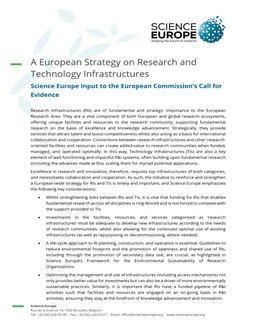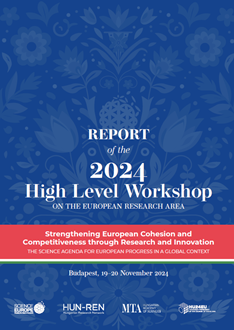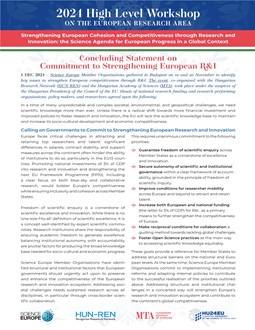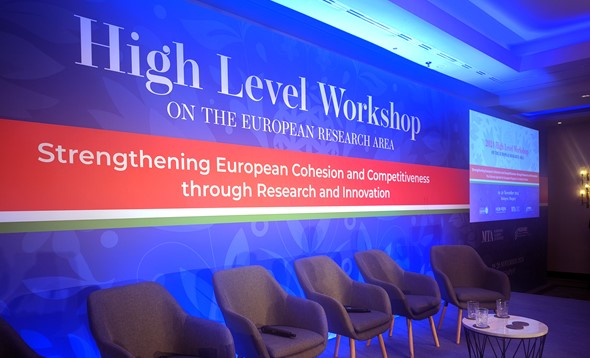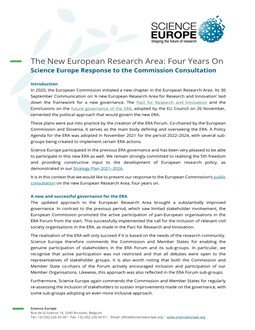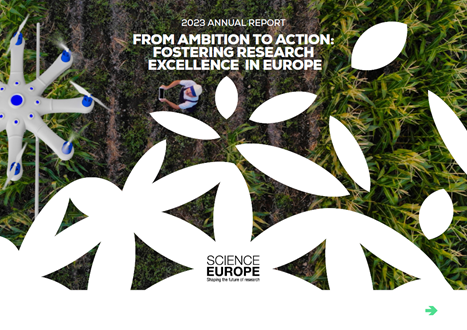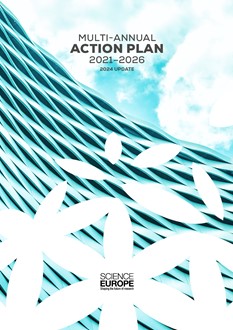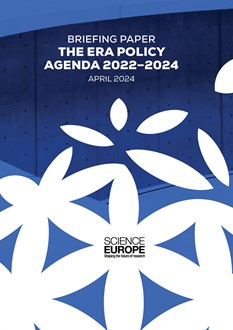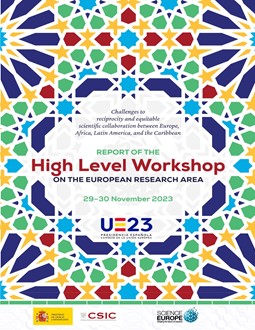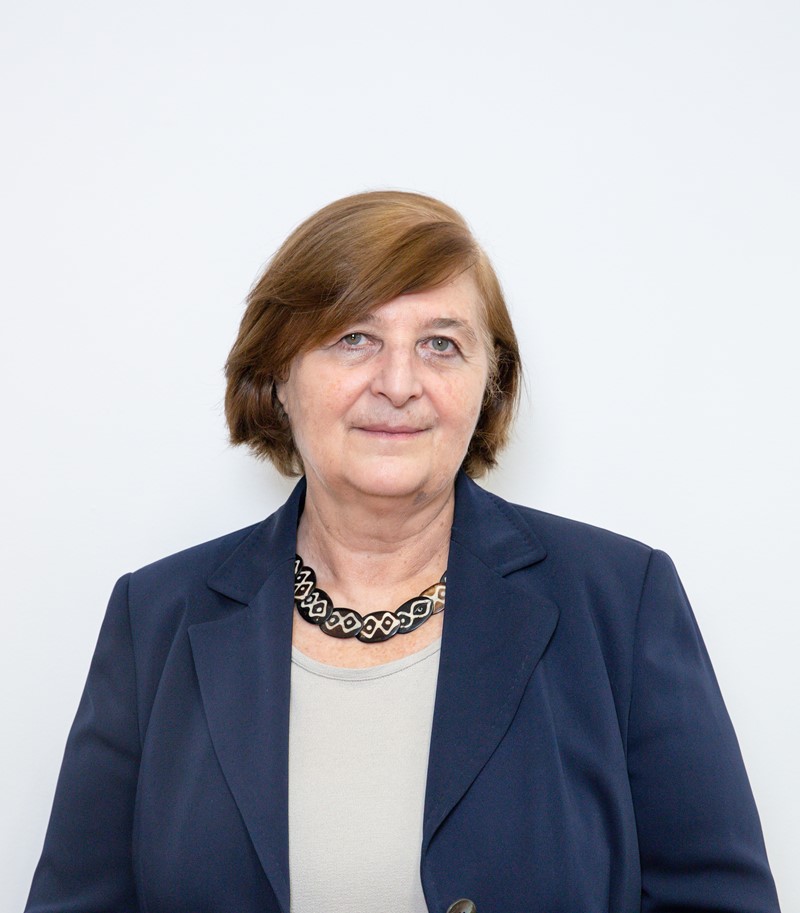
-
Share on
Conversation with Professor Helena Pereira, President of FCT
The Foundation for Science and Technology (FCT) is a crucial actor in the Portuguese research and Innovation landscape, therefore playing an important role in the implementation of the Portuguese priorities during the Presidency period. Lidia Borrell-Damian, Secretary General of Science Europe, interviewed Professor Helena Pereira, President of FCT to discuss the presidency, ERA, and the work of FCT.
In November 2020, the Foundation for Science and Technology (FCT) in Portugal hosted, in collaboration with the Portuguese Ministry of Science, Technology and Higher Education and with Science Europe, the 2020 SE High Level Workshop, which identified key issues to build a more effective European Research Area (ERA) to face the different dimensions of the Covid-19 crisis and build resilience for future societal challenges.

Key issues included cross-border collaboration, Open Science, research excellence, inclusiveness, cross-sectoral mobility, free circulation of researchers, interdisciplinarity, access to research infrastructure, and the links between science and society. Moreover, the discussions tackled evolution trends in the research culture, and the need to recognise and reward a wider range of research contributions and skillsets than has been done so far.
Among other priorities, the Portuguese Presidency addresses societal challenges that need large investments in research and innovation. These include the transition to a competitive and carbon neutral economy, the security of energy supplies, space research, and digital solutions and strategies for the green transition in the fields of health, industrial property, justice, and mobility.
LBD: Professor Pereira, thank you for joining me today.
HP: It is a pleasure. I hope next time we will be able to meet in beautiful Lisbon as that would have been even nicer.
LBD: We worked very closely together for last year’s High Level Workshop where we addressed key issues for the future ERA and discussed the then upcoming Portuguese presidency of the Council of the EU. Now in full swing, the Presidency runs from January to June 2021, and with FCT as an important partner, please explain to us your involvement in the process and the priorities you hope to address.
HP: As a funding agency in Portugal, FCT is involved with the Presidency in all matters related to science. We liaise very closely with Manuel Heitor, the Portuguese Minister of Science, Technology and Higher Education Minister, and have been involved in preparing the debates and discussions for research at large. It’s been a long process; we started preparing last year with the trio countries (the countries that host the Presidency before and after Portugal), Germany and Slovenia, and were in close communication with DG RTD at the European Commission.
From the beginning what we wanted to do was to increase the importance and visibility of science and research in Europe and the European Research Area. There were aspects that were very close to our hearts that warranted further attention and one such key topic for Portugal was addressing research careers. Researchers are the pillar of our system – without them science does not exist. Researchers need to have their career paths strengthened at national and European levels to improve mobility and provide greater flexibility. Mobility not only between countries and regions, but also between sectors. We believe it will be fruitful for researchers’ careers to be able to move from fundamental research to applied research, and from the public to the private sector. For this to happen, we need to renew the EU Charter for our researchers and establish mechanisms for this renewed mobility.
Societal recognition of science is also hugely important. One positive thing to come out of this pandemic is the recognition of how important knowledge is. Knowledge cannot be created from one day to the next. Long lasting programmes that build knowledge are needed, and then this knowledge base can be accessed to help solve new and emerging problems. Research is at the basis of our development, socially, culturally, and economically speaking.
LBD: Thank you, that sets the scene nicely and recognises that there are some very complex issues to address. Twenty years ago, in 2000, the ERA was created under the Portuguese Presidency, and today Portugal is again at the helm at another crucial moment as we prepare for the implementation of the new ERA and a paradigm shift in our societies. What do you think has been achieved in the last 20 years?
HP: We have achieved a lot and we should be proud of the way we have developed. Of course, we want more and there are still big topics to tackle but we should not forget what has been achieved. Europe has increased its scientific capacity and its collaboration, not only between countries, regions, and different research groups but today we can clearly witness better cooperation with the private sector and other societal groups. Portugal is a great case study as we have experienced many developments in our science system during the last 20 years. Before, we had a very timid research landscape, but now any indicator you choose (for example the number of PhDs, the number and impact of publications) will show you that things are improving, and we are building capacity.
The challenge we face today is how should we plan the next 20 years? How can we mature further with our ‘new’ European Research Area? The world has evolved, and we must now consider aspects that were not so urgent 20 years ago, for example the questions related to climate change, sustainability, and green and digital transition. Diversity will also be a key issue to take into account, real policies on inclusiveness are necessary so our differences are embraced and included in our systems.
LBD: It is true that inclusiveness is a real challenge as it requires us to move from a traditional approach that only considered things like gender balance to a much broader set of considerations. Reflecting on the role Science Europe can play, bringing together national funders and performers, what can we do as a collective?
HP: Science Europe is very important. Together we are much stronger than we are alone. It is essential we know our colleagues in other research organisations and that we can meet and learn what we are doing and what functions well or not so well. In turn, we can improve our procedures and instruments thanks to the experience and input of others. The next step should be to establish cross cutting instruments, tools, and programmes to help implement useful or improved methods of funding and supporting research.
LBD: That is a great suggestion thank you. How do you think your membership to Science Europe contributes to the work of FCT?
HP: When we participate in a multilateral or international organisation like Science Europe there is no competition between us. We can express our ideas and discuss freely, and we learn and exchange a lot. If we look at what has been done for Open Science and research data management, the work and outputs of Science Europe have been crucial in helping us improve and align our approach in these key areas.
LBD: You mentioned earlier how important the researchers are, that they are at the centre of this whole process, and also how important mobility is for researchers. In times of COVID-19 we have discovered a new type of mobility, the ‘digital mobility’. How will this play out in the future in terms of researchers’ mobility? Are the digital methods here to stay?
HP: I think we learned a lot during this period. We will most probably have a hybrid approach in the future. Physical presence is essential, we like to be close to our colleagues, but we have learned that we can still work very efficiently remotely. We have succeeded in talking and collaborating with colleagues across the world without ever leaving our home desks and have more opportunities for interaction today thanks to these remote methods. In the future, we should be selective in choosing what will be done face-to-face versus remotely – we should take advantage and devote the moments when we are physically together for high quality interaction, networking, and discussion.
LBD: Thank you Helena, your responses were insightful.
HP: Lidia, thank you also, it was my pleasure.






